Reflexive PronounsOverview and DefinitionWhen the subject and object of a phrase are the same, reflexive pronouns are employed. They are terms that end in -self or -selves (e.g., I have faith in myself). These can function as direct or indirect object. 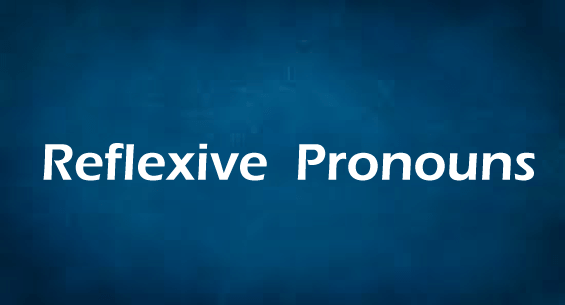
Myself, yourself, him, her, oneself, itself, ourselves, yourselves, and themselves are the nine English reflexive pronouns. They are referring to a person or object. Hence at the time when the subjects and objects of the verbs are exact, one mostly utilizes reflexive pronoun. (This can be one of the important rules of reflexive pronoun) Let us look at few instances of reflexive pronoun;
When Should You Use Reflexive Pronouns?Reflexive pronouns are utilized to showcase/ display that the subject is acting on or for itself. Rather than acting on another object, the subject acts on itself, whether literally or metaphorically. This is especially useful when utilizing the third-person plural. Let us see the below- mentioned statements: They enthralled them. They enthralled themselves. 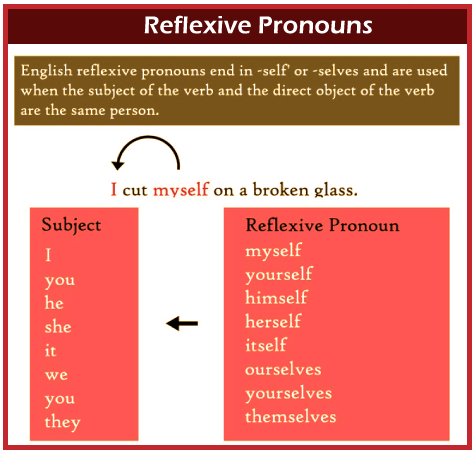
In the first example, it's unclear if "them" refers to anything else or to the original "they," the statement's subject/noun. You have a better comprehension in the second scenario since you know that anything or anyone "they" refers to is the same as "themselves." Reflexive Pronouns Are ObjectsThe conclusion of reflexive pronouns is a major distinguishing feature. They typically finish in -self or -selves and relate back to a word or pronoun that was previously stated. One important thing to consider is that the pronoun is always employed as the object of a phrase, occurring after the verbs. As an example: I trained myself to play instruments. You know yourself best than anybody else. The subject/noun in the first instance is "I," the verb is "train," and the reflexive pronoun "myself" refers back to the noun "I." "Myself" is also the object, as it responds to the word "trained." In the above mentioned scenario, the subject/noun is "you," the verb is "know," and the reflexive pronouns is "yourself," that alluded back to the noun "you." You" is also the object, responding to the word "know." Reflexive Pronouns as Direct or Indirect ObjectsThese can refer to both direct and indirect objects. When a reflexive pronoun is a direct object, it functions similarly to the subject and gets the function of a transitive verb, such as: I cut myself while chopping down the plant. We have been gearing up ourselves for influenza season. When the reflexive pronouns are utilized as the indirect objects, it explains why or for whom the act or the action is undertaken. As an example: I purchased a small automobile for myself. We will offer ourselves a binge day. 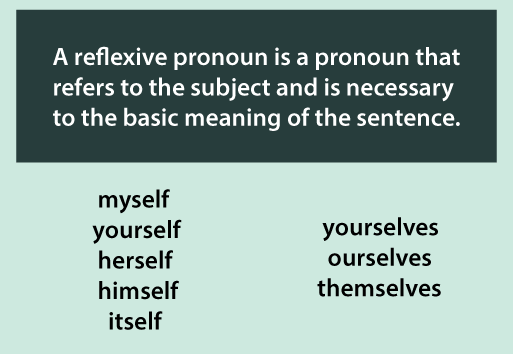
Reflexive Pronouns to Exhibit Independent ActionsYou can employ reflexive pronouns in conjunction with the term "by" to signify "alone" or "without assistance": I went to the theatre by myself. The kids cleaned up their dormitories by themselves. Reflexive Pronouns as Intensive PronounsThese pronouns also can be employed to emphasize the nouns or pronouns, in which case they are referred to as emphatic or intensive pronoun. When it is emphatic, the pronoun can be omitted, and the statement will still make logical sense: I authored all the lyrics myself. (I authored all the lyrics.) Thomas isn't bluffing. Peter himself confessed to me. (Peter confessed to me.) Common Mistakes When Using Reflexive PronounsCertain sectors are rife with the overuse of reflexive pronouns. The most prevalent error is using reflexive pronouns in compound subjects or complex objects in a phrase. Below is the perfect instance of the initial type of offense. Ian and myself will undertake today's conference. - Incorrect How do we understand that myself somehow doesn't belong in this sentence as part of the compound subject (Ian and the speaker)? Remove Ian from the picture and see if what remains works properly. Myself will undertake today's conference. - Incorrect Apparently, myself is ineffective, but the subject pronoun I is. I will undertake today's conference.- Correct Ian and I will undertake today's conference.- Correct In present day corporate world, the incorrect usage of reflexive pronoun as the object is just as common. You may send your expenditures to Mr. James or myself before Saturday.- Incorrect Mr. James and the speaker are the indirect objects of this phrase, and you are the subject. By removing Mr. James from the statement, it becomes clear that myself will not apply here in the statement. You may send your expenditures to myself before Saturday.- Incorrect Rather, the statement necessitates the use of the object pronoun me. You may send your expenditures to me before Saturday.- Correct You may send your expenditures to Mr. James or me before Saturday.- Correct 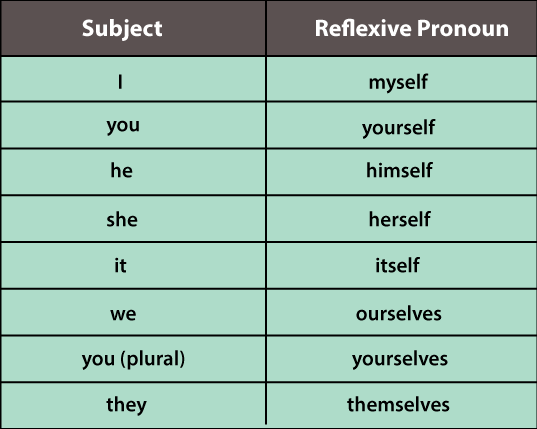
ConclusionIn ordinary language, reflexive pronouns are common. These permit you to clearly refer back to or highlight on the subjects of the statements. Some more examples of Reflexive Pronouns
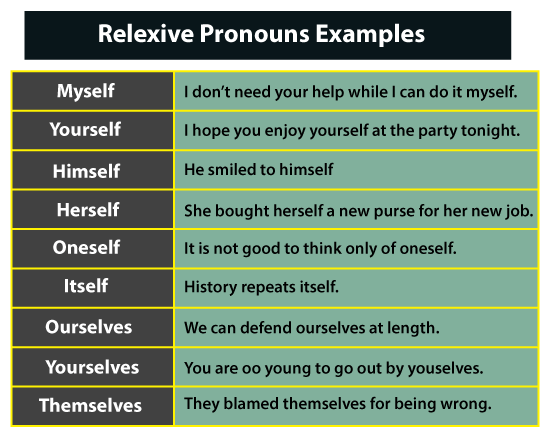
This concludes the lesson on Reflexive Pronouns, practicing it often can help you grasp the concept better.
Next TopicDistributive Pronouns
|
 For Videos Join Our Youtube Channel: Join Now
For Videos Join Our Youtube Channel: Join Now
Feedback
- Send your Feedback to [email protected]
Help Others, Please Share










